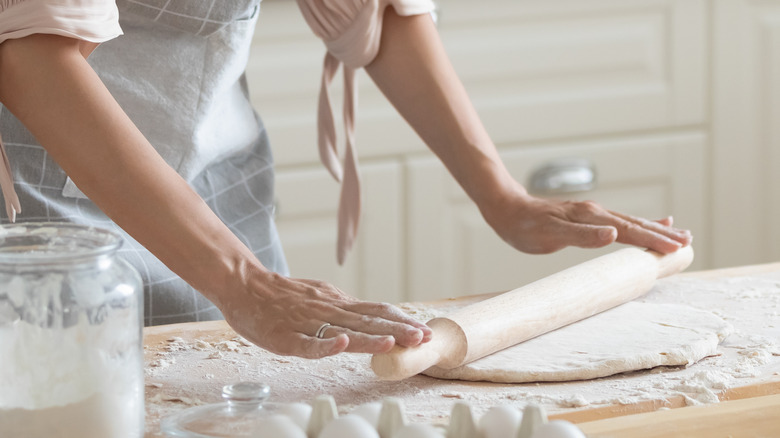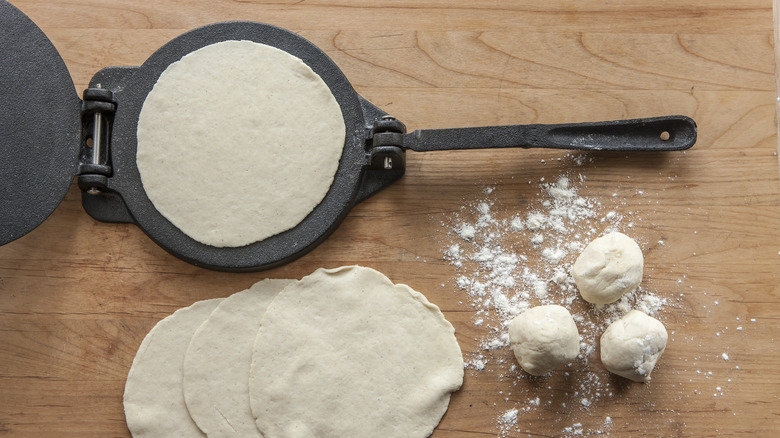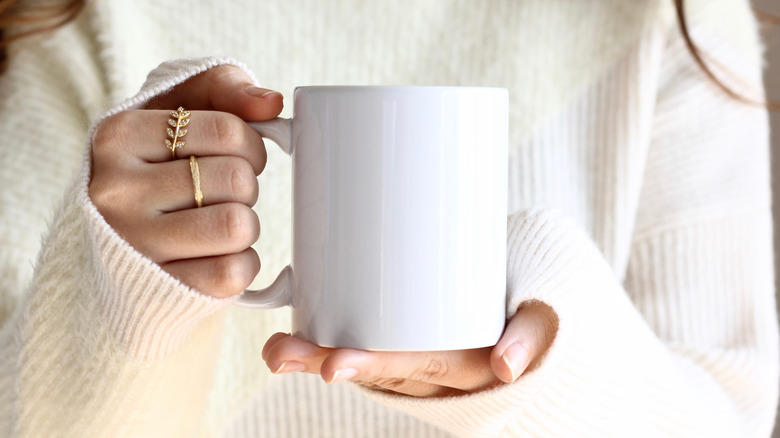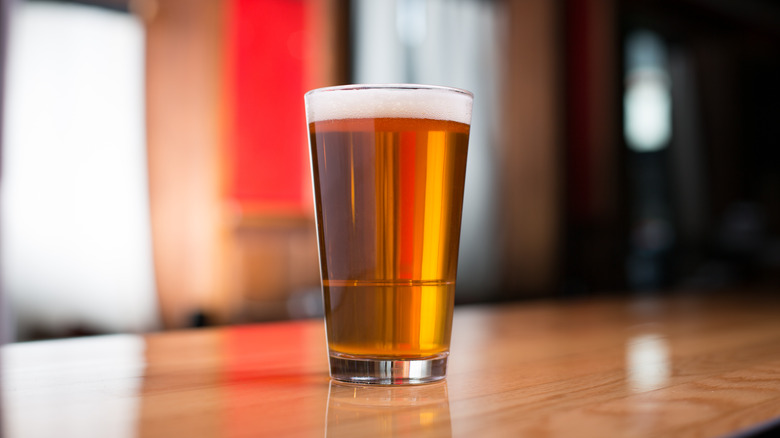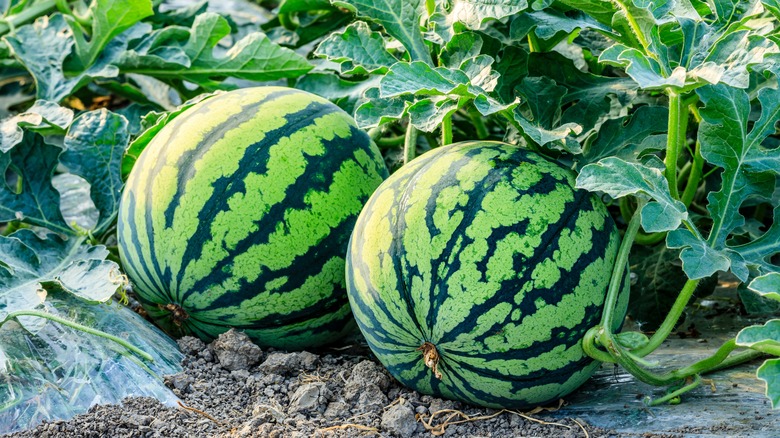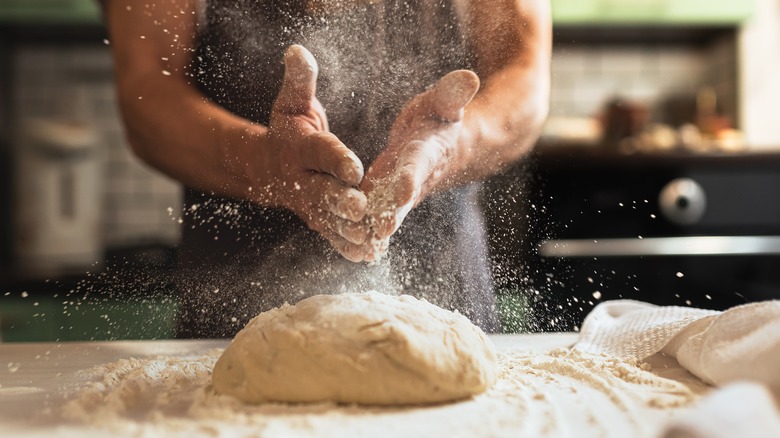10 Rolling Pin Substitutes That Could Come In Handy
A rolling pin is one of several essential kitchen tools. They are used to roll out dough for things like bread, pastry, pasta, cookies, and other baked goods, and sturdier ones can even be used to tenderize meat. The most commonly found rolling pin style is a wooden cylinder with a rod running through the center, often set on a ball bearing that allows the cylinder to roll. Other styles include the French style, which is longer and tapers toward the ends to give the tool a more diverse function, as well as the simple, shorter, more narrow rod on its own that is uniform in width through.
Rolling pins are not necessarily an expensive purchase. But for those who find themselves cooking or baking in a pinch, in an unfamiliar location, or in a new home yet to be filled with common kitchen tools and gadgets, the absence of a rolling pin doesn't mean you can't complete the task at hand. Here are some alternatives to your rolling pin that may come in handy more often than you would think.
Wine bottle
The first alternative is almost definitely something you'll have lying around the house: a wine bottle. Wine bottles are a great substitute for a rolling pin because they are long, have an even width throughout the body, and are made of thick glass you will not have to worry about breaking. Also, it really does not matter if the wine bottle is empty or unopened. Either way, it will still work for rolling out whatever dough sits on your countertop.
You will probably want to avoid using opened, unfinished bottles of wine, however, as you definitely want to avoid any chance of wine drops getting into your dough as much as possible. If a bottle is unopened and sealed with a cork or cap, this will not be a concern. If a recipe — such as one for croissants — calls for butter or dough to be pounded, a wine bottle probably shouldn't be used, because although the glass is thick, it could still crack or shatter.
Reusable water bottle
A reusable water bottle is one rolling pin substitute that you probably don't have to worry about breaking. Most reusable water bottles made today are made with double-insulated aluminum or steel, so any chance of cracking it on a block of chilled butter is very slim. Plus, the exterior of reusable water bottles is easy to clean (and should be cleaned often), so on the off chance you do in fact use yours as a rolling pin, it will make for easy cleanup.
One drawback of using a reusable water bottle as a rolling pin alternative is not all of them are uniform in shape. Many have wide bases that taper upwards toward the cap, and some can have abrupt juts in the middle of the body for easier gripping. You will want to avoid the latter in particular because rolling out dough is all about even thickness. Bottles that are tapered can actually work to your advantage, however. French rolling pins with similarly narrow ends are made to provide more control and range. Even so, any reusable water bottle that has a good portion of even width can certainly come in handy.
Vase
Just like how not all reusable water bottles can work as a rolling pin, not every vase can either. Probably more than any other item on this list, there are many variables that go into potentially using a vase to roll out dough. Firstly, many households have vases that are passed down from one generation to the next as family heirlooms. This probably goes without saying, but do not use your great-grandmother's turn-of-the-century vase to shape up your pizza dough, even if it is sturdy and uniform in shape.
This is another variable at play. Vases, and pottery in general, are an art form. Many are made to serve the purpose of design and craft and not simply to hold flowers. Because many vases are designed as such, they are commonly formed into unique shapes that serve more of an aesthetic function than a physical function, so these vases will obviously not work as a rolling pin. The only ones that will are uniformly shaped vases with thick, sturdy bodies. Again, they are still more fragile than a steel water bottle or even a wine bottle, so be careful using one and certainly only do so for simple rolling.
Tortilla press
The tortilla press is the first, and only, rolling pin alternative on this list that's actually another kitchen tool. Also, unlike any other item on this list, a tortilla press will not roll out the dough. Per its name, it will press the dough flat into an evenly thick, circular shape.
Obviously, tortilla presses are used for making classic corn tortillas. Two flat, cast-iron plates are held atop one another on a hinge, with a handle attached to the bottom plate. After placing a piece of dough on the bottom plate, the top is lowered and pressed against the bottom with pressure, using the handle. This completely flattens whatever is in between the plates evenly and quickly. A lot of dough recipes may require a more delicate touch, but a tortilla press is a quick and simple way to get some evenly flat dough.
One key tip is to spray the inside of the plates with non-stick spray, or cover each of them with plastic wrap. Because a lot of pressure is applied to the dough inside the press, it will definitely stick in the absence of spray or plastic.
Ceramic mug
This option will probably require the most patience, but a ceramic mug will do just fine in place of a rolling pin if need be. What is great about a classic ceramic mug for rolling dough is they are completely uniform in shape and are evenly round throughout, the only exception being the handle. This means that if do find yourself rolling out dough with a mug, it will have to be done in shorter strokes, rotating the mug back around, and passing the handle each time. Or, depending on the type of dough you are rolling, you can just press the mug directly across the entire surface of the dough over and over again until it is evenly flat.
Other than the added time consumption, rolling out dough with a ceramic mug will also not be ideal for holding flour. Many recipes recommend your rolling pin be lightly or thoroughly dusted with flour, which unfortunately slides off any ceramic surface. If you're using a mug and want to avoid sticking, you can flour the dough instead and pay close attention to it as you move along, adding more when necessary.
Cardboard tube
Wrapping paper is an item that everyone is almost certain to have in some place inside their home. And it turns the long cardboard tube the paper wraps around can be used for much more than lightsaber duels. Try to remember this the next time you reach the end of a roll of wrapping paper, and maybe one day you'll call upon one to roll out some dough.
One certainty is that cardboard tubes have an even width throughout, and many of them are thick and sturdy. The ones that are made of thinner, flimsier cardboard will probably not be able to satisfy this function. Also, the cardboard will be able to catch and hold flour to its surface better than a surface such as ceramic or glass, so sticking will most likely be minimal. Again, like many other rolling pin alternatives on this list, a cardboard tube is not ideal, but that doesn't mean it can't get the job done.
PVC pipe
Another perfectly adequate rolling pin substitute is a piece of PVC pipe. Now commonly used in a variety of functions in plumbing or construction, these pipes are basically the more sturdy version of cardboard tubing. They're very thick and have a surface that will basically not give. PVC pipes have to be sawed in order to be broken apart, so they can definitely stand up to some dough with no problem. These pipes are another option that can also be used for pounding out laminated dough or butter due to their strength and resilience.
PVC piping is also a good option because it is very inexpensive. You can get whatever length you need for a low price. This list does encourage you to take advantage of what is already available to you, and if you are going out to buy PVC pipe, maybe picking up an actual rolling pin is a better idea. But if you find yourself in need of a rolling pin without one handy, coming across some PVC pipe in a storage closet or garage will do just fine.
Pint glass
Pint glasses will function as a rolling pin pretty much the same way as a wine bottle would, the only difference being pint glasses are considerably shorter. Other than that, pint glasses' thick glass and round shape will work well to roll out your dough. One potential drawback worth noting, however, is the very slight taper of a classic pint glass. The base is just a tad bit narrower than the rim on top. You'll notice this if you roll a pint glass on a flat surface, it will roll in favor of whichever side the bottom is on. For rolling out dough, this simply means paying attention to the roll of the glass on top of the dough and adjusting your pressure and its position accordingly.
It should also be noted that this tip only goes for the classic-shaped pint glasses described above. Glasses with a tulip shape or those unique-looking IPA glasses will not work well for rolling out dough. And just as with a wine bottle, you should avoid recipes that call for beating butter to avoid the risk of glass shattering. Even still, pint glasses are one of the more common household items on this list and will be a fine substitute for a rolling pin as long as you have it in a kitchen cabinet, which you most likely already do.
Watermelon
This next item may seem ridiculous, but a watermelon can work as a surprisingly simple and effective alternative to a rolling pin. The size, weight, and shape of watermelons mean this fruit is destined to serve an additional function beyond delicious refreshment. Placing your dough on your work surface, hoisting your watermelon to the edge, and rolling it firmly across the dough will actually yield a fairly evenly-pressed dough. It is best to find the most evenly round side of the watermelon, of course. The more even, the better.
The best part of this experimental method is that the watermelon does most of the work. Its weight will distribute the pressure for you and you'll hardly have to apply any yourself the way you would with a mug, pint glass, or even a regular rolling pin. Even if you already have a perfectly good rolling pin in your kitchen, this method might just be worth a try for the fun of it.
Your hands
Ask any experienced baker, whether they bake professionally or at home — there is no tool more valuable than your hands. Of course, there are kitchen tools that complete tasks better than any human hands can, such as a can opener or lattice roller. But when it comes to working with and shaping dough, your hands are the most trustworthy tool you have, and the more you use them, the more cooking and baking knowledge you gain.
For example, baking something with delicate variables — like sourdough bread, which can be easy to make mistakes with — can really only be improved upon by your sense of touch. Yes, you can certainly learn by seeing, smelling, or tasting results, but knowing how something should feel at a certain stage of the process is a priceless addition to your cooking or baking skill set. There is obviously no shame in using a rolling pin or any of the alternatives listed above, but if you ever find yourself in need of a rolling pin without one present, relying on your humble hands should be viewed as an opportune challenge rather than discouragement.
